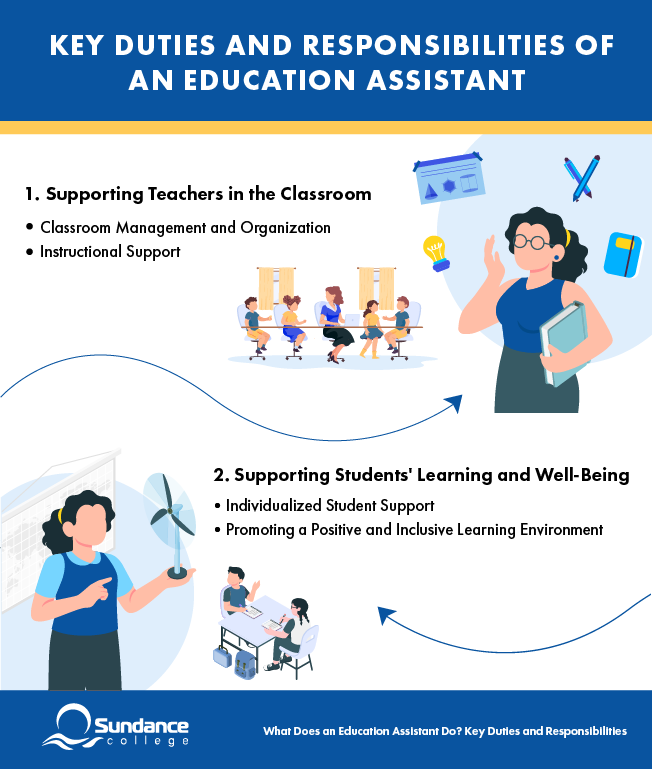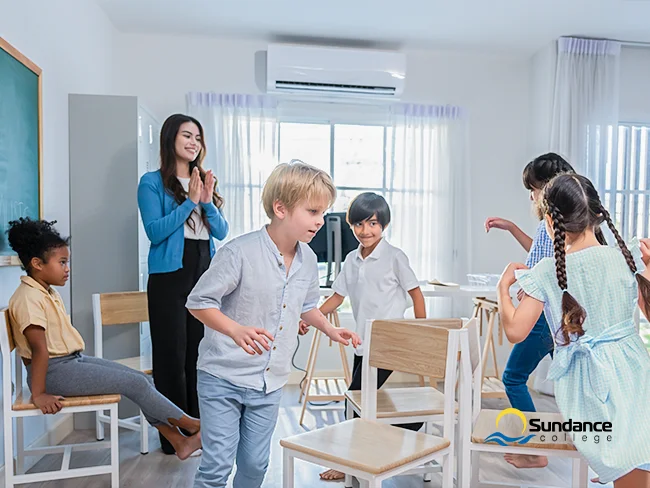Blog / What Does an Educational Assistant Do? Key Duties and Responsibilities
What Does an Educational Assistant Do? Key Duties and Responsibilities

Education Assistant Diploma
- Education Assistant
- Educational Resources Assistant
- Homework Assistant
- Remedial Education Aide
Table of Contents
An education assistant is a key part of the school team, helping both teachers and students, especially those with special needs, by helping them with learning, assignments, and personal care.
EAs also set up classrooms, keep things organized, and make sure students are safe and happy during the day. By being there to guide and encourage, they help create a positive and inclusive space where every student can do their best.
Listen to: What Does an Educational Assistant Do? Key Duties and Responsibilities
You enter the school hall. Children are lining up, waiting for the bell to invite them into the classroom. So smart, so cute, so funny! You smile in return.
“Hi, Mark! Hi, Jessica! What a lovely backpack, Judie!” You greet each student by name while counting them to ensure you haven’t missed anyone…
Have you been thinking more and more about becoming an education assistant these days? If so, you may be wondering what will happen after counting all the Marks and Judies🙂
What does a typical day as an education assistant involve? How well will this role fit with your personality?
This article is here to walk you through it all, highlighting the key teacher assistant duties, so you can try this profession on yourself and make an informed career decision.
Role of an Education Assistant
Being that friendly face greeting the Marks and Judies in the hallway is a great start, but it’s only the beginning. As an educational assistant in school, you’re the behind-the-scenes coordinator of the classroom — always ready to jump in where you’re needed most. Whether it’s helping students tackle tricky lessons, setting up materials for the day’s activities, or offering a little extra support when things get tough, your role is dynamic and essential.
As a teacher assistant, you’ll also team up with teachers, parents, and other specialists, all working toward one big goal: helping every student shine and succeed. Being an education assistant is about wearing many hats, bringing your energy, and making a difference every day.
Key Duties and Responsibilities of Educational Assistants

By now, you’ve probably figured out that the main roles and responsibilities of educational assistants revolve around two key areas: supporting teachers and supporting students. But what does that really look like day-to-day? Let’s take a closer look at each of these important roles.
Supporting Teachers in the Classroom
The bell rings, and students rush in, eager to start the day.
Ms. Johnson, a teacher, begins the morning lesson. You notice Michael — a 6-year-old with curly red hair — digging through his desk, looking worried. Kneeling beside him, you ask quietly, “Michael, what’s up?” He whispers, “I can’t find my crayons.” You quickly grab a set from the supply shelf, and his face lights up as he starts coloring.
Later, during a math lesson, the teacher – Ms. Johnson – is teaching addition, explaining how three apples plus four apples equals seven. You notice Emma, a shy girl with big blue eyes, fidgeting with her pencil. Sensing she needs help, you kneel beside her and softly say, “Let’s figure this out together.” Guiding her through counting the apples, you ask, “So, Emma, how many apples do you have now?” Her face brightens as she confidently replies, “Seven!”
These moments capture one part of your role as an educational assistant — supporting teachers in the classroom. Let’s break down the specific school assistant responsibilities you’ll handle while doing that.

1. Classroom Management and Organization
In your role as an education assistant, you’ll be doing things like:
- Getting the classroom ready with all the materials students need
- Helping keep the classroom organized and making sure kids stay focused
- Taking attendance and maintaining student records to keep track of everyone
- Completing clerical tasks like grading or copying materials to make sure everything runs smoothly
- Handling little issues that pop up so the teacher can keep the lesson going
Organizing and managing classrooms smoothly allows you to directly contribute to a positive learning environment, making you a valuable part of the teaching team.
2. Instructional Support
You’ll also play a key role in supporting lessons, which includes:
- Assisting teachers with delivering lessons by providing hands-on help to students
- Developing engaging presentations or supplementary materials to enhance learning experiences for students
- Revising or adapting coursework for small group instruction, making sure all students can participate and understand
- Offering one-on-one assistance, so no student gets left behind
- Encouraging and supporting students who might be struggling, helping them build confidence
Instructional support also involves using technology to enhance learning. As Sundance College’s Education Assistant instructor Joanna M. notes, “21st Century Education emphasizes the use of technology in today’s world of increasing technological development.”
By excelling in these skills, you’ll help create inclusive education strategies, providing a supportive learning experience that directly impacts students’ success.
Supporting Students’ Learning and Well-Being

Back in the classroom, the students settle in for reading time. You notice Liam, a tall boy with tousled brown hair, staring out the window. “Need some help, Liam?” you ask gently. He nods, and you sit beside him, guiding him through the words until his focus sharpens and he reads confidently.
Later, during recess, you spot Sophie, a usually cheerful girl, sitting alone. “Is everything okay, Sophie?” you ask. She sighs, “My best friend is sick today.” You offer a few comforting words, and soon she’s back on her feet, ready to join her classmates.
These interactions are just a glimpse of the support you provide to students every day. Let’s break down the specific educational assistant roles and responsibilities you’ll take on to support students’ learning and well-being.
1. Individualized Student Support
A significant part of your role as a student support worker involves providing direct, personalized support to students who need it most. This includes:
- Providing one-on-one academic support to students who need extra help
- Offering emotional and physical support to students with special needs, making sure they feel safe and included
- Collaborating with teachers and parents to implement Individualized Education Plans (IEPs) tailored to each students’ needs
While this support is crucial, it’s important to understand the boundaries of the role. As EA Joanna explains, “Education assistants are not responsible for teaching or lesson planning. They support the classroom teacher, helping with students’ needs without having to manage curriculum or government policies.”
This individual support directly impacts each student’s learning, helping them overcome challenges and succeed academically and emotionally – one of the key reasons to become an education assistant.
2. Promoting a Positive and Inclusive Learning Environment
Creating a maintaining a welcoming, inclusive atmosphere is another key aspect of your job. This involves:
- Monitoring student behaviour and assisting with classroom behaviour management to keep the learning environment focused and orderly, so students stay on track
- Encouraging inclusivity by helping students engage with their peers and catering to diverse learning styles
- Supervising students during non-instructional activities such as recess and field trips, ensuring their safety and engagement
- De-escalating conflicts and supporting social-emotional learning
By using your educational assistant skills to foster a positive and inclusive atmosphere, you help create a classroom where all students feel valued and ready to learn, contributing to their overall development.
Best Part of Working as an Education Assistant
The role of an education assistant is different from that of a teacher, but it’s just as important to students’ learning and well-being. Why?
Imagine years from now, welcoming new students, only to find their parents are:
- Michael, a famous artist, because you helped find those crayons.
- Emma, a successful web developer, thanks to the confidence you built in her during math.
- Liam, a best-selling author, because you unlocked his love for reading.
- Sophie, a popular YouTube blogger, who learned to connect through your comforting words.
The most rewarding part of being an educational assistant is knowing you’ve shaped the future of Canadian children. Always remember the impact you can make!
Where Can Educational Assistants Work?
As an educational assistant, you’ll have the opportunity to work in a variety of learning environments, helping students and teachers wherever support is needed.
Here’s a look at some of the key EA career paths in settings where you can make a real difference:
- Public and private schools
- Special needs schools
- Treatment centres
- Community programs
- Colleges and universities
- Online classrooms
- Childcare centres
- Home-based support
From classrooms to community spaces and even virtual platforms, teacher assistants are adaptable professionals who create supportive learning experiences wherever they go.
To secure an education assistant role, you need the right training and preparation. Sundance College can help you achieve this. Our 43-week Education Assistant Diploma program, including a 10-week practicum experience in education, gives you the skills and experience to succeed.
As Joanna shares, “The 10-week straight practicum, with 200 hours of continuous in-person experience, makes sure you get the most out of your training. Teaching is not just theoretical; it’s mostly about hands-on experience.”
Discover more about the program and how Sundance College can prepare you for this meaningful career. Your future self — and the students you’ll help — will thank you!
Subscribe for more career advice
Blog Categories
Share on:
